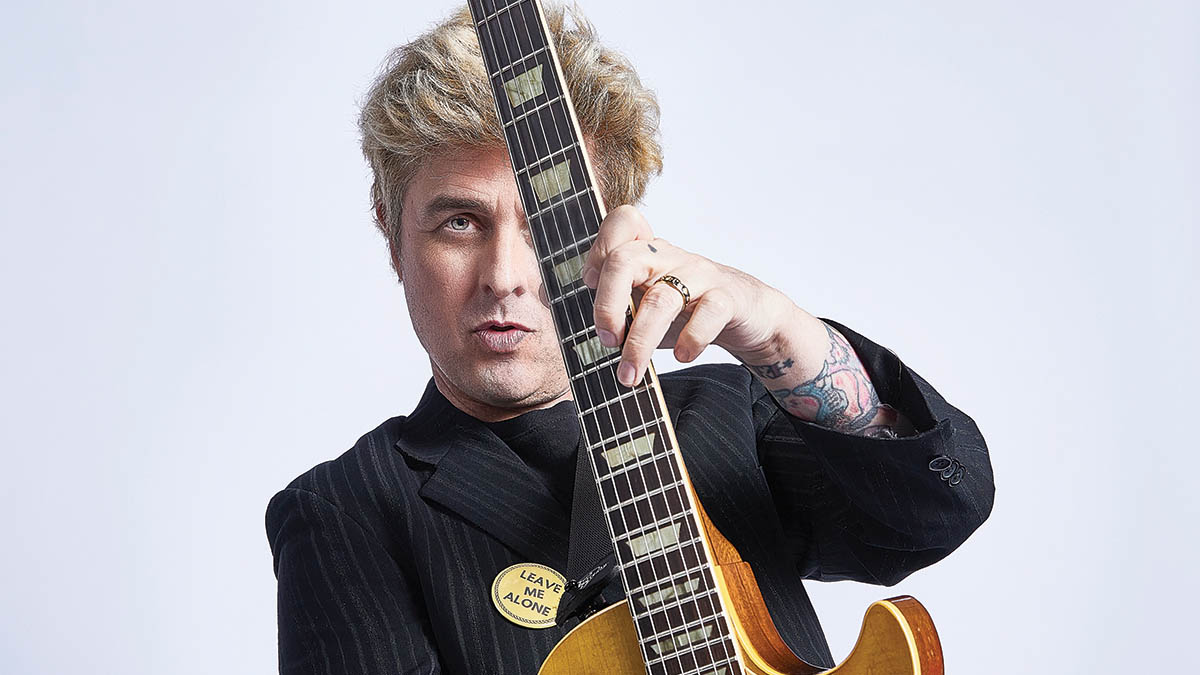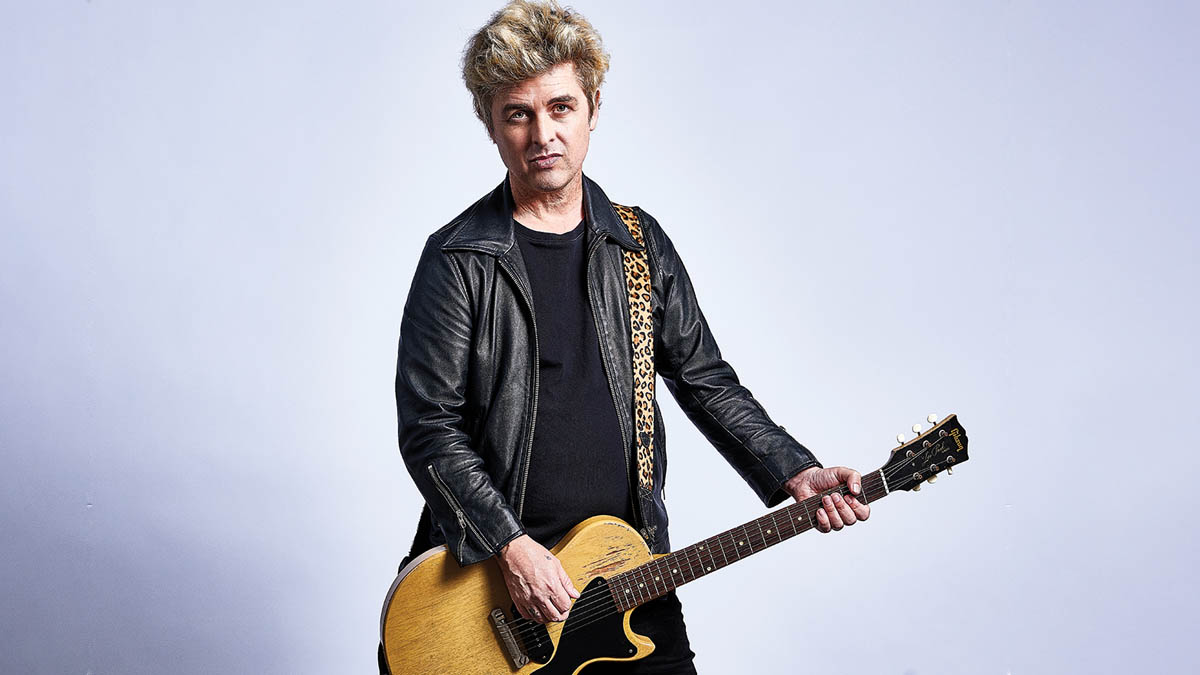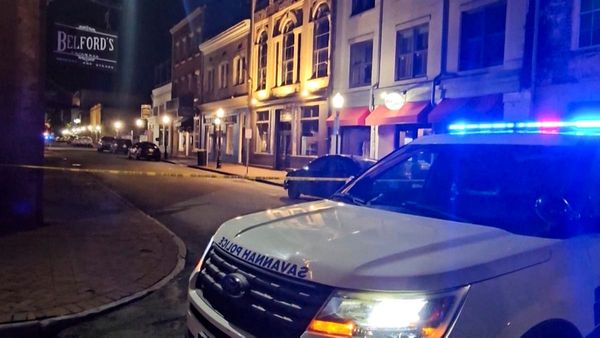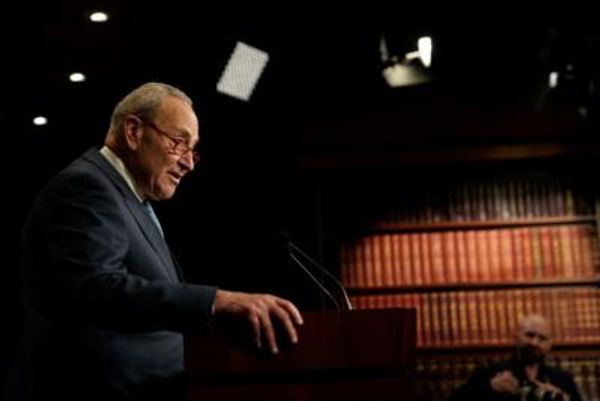
Green Day burst onto the scene – or, at least, the mainstream scene – 30 years ago with Dookie, the multi-platinum monster of a record that was largely responsible for dragging punk rock out of cramped clubs and dingy DIY venues and into the world of sold-out arenas, glossy magazine covers and near-constant radio and MTV rotation.
And while the trio – singer and guitarist Billie Joe Armstrong, bassist Mike Dirnt and drummer Tré Cool – remain by far the most commercially successful punk band in history, they’ve also spent the last three decades taking a torch to any conventional ideas of what punk actually is.
Unless, of course, you ask Armstrong, who never subscribed to conventionality in the first place. “Punk, to me, has always meant freedom,” he tells Guitar World. “Maybe there’s some people where it’s just about being an aggressive punk-rocker and saying, ‘fuck society’ and falling into all those sorts of clichés. But that’s not my definition. For me it’s about getting into the deep end of the water as an artist. All that other stuff is just limitations.”
From the smash acoustic ballad Good Riddance (Time of Your Life) to the nine-minute, multi-movement epic Jesus of Suburbia, to the ambitious, ultimately era-defining concept album American Idiot (and its ensuing Broadway stage adaptation), Armstrong and Green Day have continually defied stock perceptions of what is and isn’t punk rock.
Their last album, 2020’s somewhat divisive Father of All Motherfuckers, largely eschewed their characteristic sound in favor of a more Motown-, soul-, garage-rock- and hip-hop-influenced approach (with Armstrong even trying out his best Prince-style falsetto on the title track). And their new and 14th studio effort, Saviors, is yet another pivot, this time toward something that is both a return to form and a further pushing out on punk’s perimeters.
In the latter category would be tracks like the celestial, widescreen Coma City, the ’80s-style hesher-rocker Corvette Summer, the ’50s-rock pastiche Bobby Sox and the glammy, chest-beating album closer (and real highlight), Fancy Sauce.
What’s more, Armstrong also opted to tweak his lead guitar approach on the record, adding in Angus Young-style double-stop-spiked phrases to Living in the ’20s, spacey, heavily effected lines to Fancy Sauce and a soaring solo to Goodnight Adeline, among other standout six-string moments, all of which contrast with his characteristic octave-style melodic work.
That said, there’s still plenty of Green Day’s archetypal amped-up, caffeinated power-chord throttle throughout Saviors, from the rampaging Look Ma, No Brains! to the hard-charging aggro-rock of Living in the ’20s, to the anthemic, American Idiot-like culture-skewering opening track and first single, The American Dream Is Killing Me.
Throughout, Armstrong paints a maddening and madcap portrait of a world gone crazy, ranting and railing about TikTok and taxes, commies and cocaine, assholes in space, grandmas on fentanyl and superheroes playing pretend. It is, in his words, a “paradise for locos,” where everyone is racist, he’s fucking his robot senseless and the Uber, apparently, is always running late.
If it all feels a bit chaotic and ludicrous, well, that’s just a reflection of the times. “Whether it’s social media or influencers or war or Trumpism or political correctness, it just feels like we’re all over the place right now,” Armstrong says. “It’s just kind of…” he pauses, then laughs. “It’s just really fucked up.”
There’s an argument to be made that the contemporary music scene can seem similarly hard to make sense of – especially for an act that built its name on three-chord guitar-rock anthems. But here as well, the 51-year-old Armstrong is confident about Green Day’s place in the modern world.
“If Green Day were a new band in this era, I feel like we would fit right in next to Ed Sheeran and Taylor Swift in a lot of ways,” he says.
“Because I just feel that if it’s good songs – if it’s great songs – you can bust through any genre or any sort of popularity contest. So I just always go to where I’m strongest, and that’s good lyrics, good melodies, good songwriting.” And, as Armstrong mentioned previously, ignoring limitations. “You have to throw yourself curveballs sometimes,” he says. “Or else you get bored, you know?”
Just days after premiering new songs from Saviors at a series of concerts in Las Vegas, Armstrong sat down with Guitar World to discuss the making of the record, the state of the world – musical and otherwise – in 2023 and, of course, guitars and gear.
He also took time to look back on the making of the landmark Dookie, which was recently issued in a massive 30th Anniversary Deluxe Edition set that, along with indelible singles like Longview, Basket Case and When I Come Around, is packed with unreleased four-track and cassette demos, outtakes and live recordings from the Dookie world tour.
“We were just three dipshits that were along on this crazy ride,” Armstrong says of the record that has now sold more than 20 million copies worldwide. “We made something we were really proud of, and we knew that we made something that we would love and people would love. We just didn’t know how many people would love it.”

Saviors is Green Day’s 14th studio album overall. As the primary songwriter in the band, did you have any particular intention as far as what you wanted to do this time out?
“You know, the intention kept changing. There were times where I just wanted to make a straight-up punk-rock record. And there were times where I wanted to do sort of stadium-rock, Britpop-sounding songs. And then there were a lot of false starts.
I was listening to Saviors and really hearing the sort of desperate cry for help that the song has. It’s trying to make some sense of the world
“So with all of it, I was almost kind of confused. But then we went into the studio with the songs we loved the most and everything seemed to come together. It was almost like the lightbulb went off as we were recording it. Like, ‘Oh, now I know what we’re doing!’”
Was there any particular song which sparked this new batch of material?
“There were a few. One was the song Saviors. And then also Look Ma, No Brains!, Goodnight Adeline and One Eyed Bastard were there, too. Then later on, I had an old demo of The American Dream Is Killing Me, and that seemed to just sort of bring the whole thing together.”
Was there a reason that you chose Saviors to be the title track of the record?
“Well, in addition to being one of the first songs I wrote for the album, I also felt like, ‘Man, this sounds like the first song off an album.’ Eventually that first song became American Dream, but when we were trying to figure out what we wanted to call the album as we were mixing, I was listening to Saviors and really hearing the sort of desperate cry for help that the song has. It’s trying to make some sense of the world. So I was like, ‘We should call the album Saviors.’ Because I think everybody’s looking for something or someone to hold onto, and to believe in.”
The stuff that I see online or on Instagram or YouTube, it just feeds the thing in your brain that your brain wants to see. You think you’re being informed, but really you’re retreating more into your own bubble
To that point, The American Dream Is Killing Me taps into that feeling of being untethered from modern society, and trying to find your way in a chaotic world. It’s something that you also addressed on American Idiot, which is now celebrating its 20th anniversary. Could you have imagined, when you were wrestling with these sorts of issues back then, that you’d still be doing it two decades later?
“I actually think our country is more divided than it’s ever been. And the thing about the American dream, the original idea of it, is just sort of lost on me at this point. On top of that, now we’re all sort of set on this algorithm that we’re being fed every day. I’m a victim of it, too. The stuff that I see online or on Instagram or YouTube, it just feeds the thing in your brain that your brain wants to see. You think you’re being informed, but really you’re retreating more into your own bubble.”
On the other hand, there’s tracks on the new record like Corvette Summer, which revel in total escapism. You just want your power chords and record stores, and to shut out the outside world.
“Totally. You definitely need to have some kind of escape from everything, whether it’s going to your favorite record store, hanging out with friends in person or just doing something where you’re not sitting in front of a screen the entire time. For me, I still listen to punk rock every day.
“I’m always looking for cool new bands, or maybe I’ll go down the rabbit hole of trying to find power-pop stuff that you can’t find anywhere except for on Discogs or specialty record stores. I do still have that escapism that I’ve had ever since I was 12 years old. So something like Corvette Summer is saying, ‘I just wanna feel good for a minute.’ Or, you know, two-and-a-half minutes. [Laughs]”
At the end of the day I’m just trying to come up with good melodies and really take my time with writing lyrics and make sure there’s nothing left unsaid
On your last record, Father of All Motherfuckers, you worked with producer Butch Walker. This time you returned to Rob Cavallo, who helmed Dookie and American Idiot, among other classic Green Day albums. What does Rob bring to the equation?
“Rob is really smart and knowledgeable. And he’s really musical – he can play the shit out of the piano, play the shit out of the guitar. He understands how to connect with the band as far as getting a really good take and gluing everybody together. And he just has non-stop energy.
“There would be times where I would start to get tired and I would shut down, but then you’ve got Rob, who will give me a second wind. And not by force, but just by creating a good vibe in the studio and having a good time and focusing everything on the positive. And being like, ‘I want to kick ass!’ in a way. He’s like a coach: ‘Let’s get out and beat people’s ass with this next song!’ And then you go, ‘Fuck, yeah, let’s go!’ [Laughs]”
Father of All diverged pretty far off of Green Day’s characteristic sound and was a polarizing record amongst fans. How do you regard it in hindsight?
“I think you make records sometimes where you have to learn more about yourself. To me, Father of All was this record that was like [Green Day side project] Foxboro Hot Tubs or something like that. Kind of garage-y. I love that stuff.
“And at the end of the day I’m just trying to come up with good melodies and really take my time with writing lyrics and make sure there’s nothing left unsaid. So I plan on making records like Father of All in the future, for sure. Everyone’s gotta make records that are their “id records” or something, you know?”
When I was a kid, I loved Eddie Van Halen and Angus Young and Randy Rhoads. And then something happened where it was like you had to be in the guitar Olympics
On Saviors, one thing that feels a bit different for you is your approach to guitar solos. For starters, there’s more of them.
“Yeah. I kind of put on my ‘rock god’ hat and just started soloing a lot. Actually, I think I soloed more on this record than any we’ve ever done. And not in a shredder kind of way, but just more like, you know, I love [late Pretenders guitarist] James Honeyman-Scott and [late David Bowie and Ian Hunter guitarist] Mick Ronson and guys like that, who play those really melodic solos that fit with the melody and what the song is calling for.
“Plus, it’s fun to just kind of go off and rip a guitar solo. Like Fancy Sauce – I’m playing that 'ghost-sounding' solo where it kind of comes in and out, and Living in the ’20s, I wanted to have a guitar solo like I Can’t Explain or an old Kinks song, where it just has that kind of haywire feel to it. It’s also very Angus [Young]-sounding. You’re bending strings and wiggling ’em around. [Laughs]”
What were your main guitars on Saviors?
“I used my ’56 Les Paul Junior a lot. A Les Paul ’burst that I’ve been using for years, that’s on a lot of the solos. A ’59 Les Paul Standard that I used quite a bit. I also had a ’53 Telecaster and a ’60 Esquire. You can hear the Tele for sure on the solo on Living in the ’20s.”
How about amps?
“I have this one amp, a Dookie amp that I haven’t used in a while, since maybe [1997’s] Nimrod. That was the main one. It’s a Marshall 100-watt Super Lead [1959SLP] that was modified by Martin at CAE [Armstrong is referring to the late Martin Golub of Custom Audio Electronics and later L.A. Sound Design]. I used that a lot for the bigger, crunchier parts of the songs.”
Is this the modded Marshall amp we’ve come to know as “Pete”?
“Yeah, it is that one. I put ‘Pete’ on it because I named it for a friend.”
What’s Pete up to these days?
“Oh, he’s hanging around somewhere. I haven’t talked to him in a while. [Laughs]”
Were you using any effects in the studio?
“I know I used my Klon [Centaur overdrive], but there wasn’t too much in the way of pedals. Just some boost type things. But there were some other amps for different tones – one I got on Craigslist, an original Roland Jazz Chorus that belonged to someone from Oingo Boingo or something.
“It’s on the song Suzie Chapstick, which has that Pretenders kind of sound to it. And then for some of the clean things, like on Bobby Sox, I used Mike [Dirnt’s] amp, actually, his ’63 Fender Bassman.”
How would you characterize your approach to the guitar these days?
“When I was a kid, I loved Eddie Van Halen and Angus Young and Randy Rhoads. And then something happened where it was like you had to be in the guitar Olympics. If you wanted to play, you had to be as good as those guys and be able to play as fast as Yngwie Malmsteen. And I was like, ‘Man, then I’m just gonna end up sitting in my room for the rest of my life. I’m never gonna be in a band, ever!’
“That’s when my tastes started changing and I started getting more into punk music and alternative, where it was more about rhythm playing. And also still about great guitar sounds and great solos, but not like the heavy metal thing, which started to become kind of a parody.
“So what happened was I got more into being an anti-solo guitar player, especially for Dookie. But I think as time went on after that, I became less bashful about saying, ‘Okay, this is stuff that I had learned along the way, that dates back to when I was 13 years old. Let’s let that free now to try to put a spotlight on a little bit more of what I’m capable of, and not be afraid of making a bad noise.’
“I’ve gotten to a point where I know my limitations, but at the same time I’m really pushing myself to be a better guitar player.”

All that said, does it feel like in 2023 people still want to hear guitar bands, in particular in a mainstream context? How does Green Day fit into that landscape?
“I mean, if we were a new band in this era, I don’t know if trying to sign to a major label and doing all that would be the right place for us. But since we have all this history of having big songs and big records and a lot of mainstream success it’s a different story.
“I also feel that we continue to generate new fans, just because there’s something about the energy of Green Day that I think a lot of young people flock to every time we put out a new album. Our fans are all ages – and I’m talking, like, 11-year-olds to 65-year-olds in our audience.”
All our favorite records, whether it’s the Beatles’ Revolver or the Who albums or the first couple of Van Halen records, one of the things that makes them great is you’re like, 'Oh, this feels like it was just made yesterday.' And Dookie still feels like that
Regarding Green Day’s longevity, 2024 marks the 30th anniversary of Dookie. In addition to putting together the Deluxe Edition package, you recently played a small club show at the Fremont Country Club in Las Vegas, where you performed the full album from front to back. When you think back to that time, what comes to mind for you?
“That record was just massive, and we were all, like, 21 years old. So it was such a crazy era for us. But the great thing about Dookie is when we were rehearsing it [for the Vegas show], it still felt fresh. It didn’t sound dated.
“And all our favorite records, whether it’s the Beatles’ Revolver or the Who albums or the first couple of Van Halen records, one of the things that makes them great is you’re like, 'Oh, this feels like it was just made yesterday.' And Dookie still feels like that.”
One interesting thing in listening to the four-track demos included on the Deluxe Edition, they’re pretty close to what we hear on the official studio versions. Some of the cassette demos veer off stylistically, but by the four-track recordings everything sounds fully realized. Is that the way you guys were working back then, with everything really tight and ready to go by the time you hit the “record” button?
“Definitely. Because we didn’t want to change our sound. Although we did want to make everything sound bigger, with fatter guitars and a bigger sonic range overall. Because our first couple records, the first one [1990’s 39/Smooth] was made for 700 bucks, and the second one [1991’s Kerplunk] was made for, like, 2,000 bucks or something like that. And in a small studio.
“So we wanted to expand on that and have a little bit more time to get better sounds. But also, we were really adamant about the fact that we grew up hearing bands go from their original sound to the big, gated reverb snare that just washes everything and makes records from the ’80s sound like shit. We didn’t want to do that. For us it was, ‘We want to reflect what we sound like live, but just make it larger.’”
In 1994, an album like Dookie would not necessarily have been pegged as an obvious hit. That was the era of grunge, when guitar rock was not exactly bright and shiny and unashamedly melodic. Did you feel out-of-step with the mainstream at that time?
“I think so. But you know, grunge had also started becoming really watered down. You could hear a lot of people were just being imitators of Nirvana and Pearl Jam. And so we were like, ‘Well, let’s just be anti-that.’ [Laughs] Maybe not necessarily ‘anti,’ but, ‘Let’s be the other side of the coin.’
“And then there’s the other side of that, where if you’re going against the mainstream grain, you could fall flat on your face, too. There’s definitely that fear. You don’t know what’s gonna happen. But we knew we made something we were really proud of, so we had that.”
And once you achieve success, then you have to contend with being perceived as sellouts. Which was a big thing in the ’90s. In fact, Green Day had to deal with it even before Dookie was released, just due to the fact that you had signed to a major label, Reprise, prior to recording the album. Looking back, does it seem a little insane how worked up people could get about that sort of thing?
“It was weird. It was crazy. I mean, I definitely feel like we were sort of the guinea pig. It’s like we were like the first pancake, you know? [Laughs] Other bands that came after us that were punk and got popular, they didn’t get the kind of backlash that we did.
We were sort of the guinea pig. It’s like we were like the first pancake, you know? Other bands that came after us that were punk and got popular, they didn’t get the kind of backlash that we did.
“But the area we come from, it’s the East Bay, it’s the home of [incendiary punk and hardcore zine] Maximum Rocknroll. So I think it was a combination of being from the area we came from and also being the first one.
“But it makes you start to really understand who your real friends are. I remember getting in fist fights with people over this shit, you know? Now, I don’t think it would really ever happen. I mean, I don’t know the scenes today, whatever their rules are, but it was crazy for us. But I know we made the right choice.”
A few days after the Fremont Country Club show you headlined the When We Were Young Festival in Vegas, where you performed alongside bands like Blink-182, Good Charlotte, Sum 41 and dozens of other acts that, to various degrees, incorporate elements of that Dookie approach into their sound. Do you hear the influence?
“Yeah, for sure. I mean, a lot of it is just because bands have told me, to my face ‘If it wasn’t for that record…’ [Laughs]”
There’s actually a whole musical universe that Dookie helped to create.
“It’s like when I listened to Generation X or the Replacements. All those big bands for me – I guess it’s what Dookie is for a lot of other bands. And I couldn’t be more grateful for that. For people to be like, ‘You put something out there that had an impact on someone else’s future’? It’s an amazing thing.”
- Saviors is out now via Reprise.







